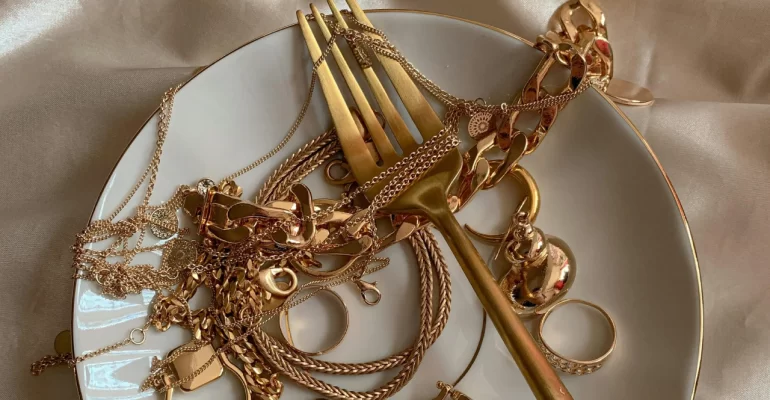The jewellery industry has long been a beacon of luxury and artistry, with gold being its most sought-after element. In recent years, a new trend has emerged, captivating both ethical consumers and innovative designers—recycled gold in jewellery. This sustainable approach not only reduces environmental impact but also redefines the concept of beauty and responsibility.
The Rise of Recycled Gold in Jewellery
The use of recycled gold in jewellery is not just a trend but a conscious shift towards sustainability. As the demand for ethical practices grows, jewellers are rethinking how they source materials. Recycled gold, which is derived from old jewellery, electronics, and industrial products, has become a cornerstone of this movement. By repurposing existing gold, the industry significantly reduces the need for environmentally damaging mining processes.
Recycled gold in jewellery is no different in quality from newly mined gold. In fact, gold is infinitely recyclable without losing its integrity. This makes it an ideal material for creating timeless pieces while aligning with the principles of environmental stewardship. Consumers today are more aware of the environmental costs of mining and are eager to invest in pieces made from recycled gold in jewellery.
Environmental Benefits of Recycled Gold in Jewellery
Mining gold is one of the most environmentally damaging processes in the world. It requires large amounts of energy and often results in deforestation, habitat destruction, and water contamination. Using recycled gold in jewellery offers a sustainable alternative. By repurposing gold that is already in circulation, the industry can minimize its ecological footprint and help preserve natural resources.
Recycled gold in jewellery also addresses the issue of waste. Tons of electronic waste containing valuable gold components are discarded annually. By reclaiming and refining these materials, jewellers contribute to a circular economy. This not only reduces the environmental burden but also ensures that the jewellery industry plays its part in tackling global waste challenges.
Ethical Appeal of Recycled Gold in Jewellery
The ethical implications of using recycled gold in jewellery are just as significant as its environmental benefits. Traditional gold mining is often associated with exploitative labor practices and social injustices. Recycled gold, on the other hand, avoids these issues entirely, offering a conflict-free alternative that aligns with the values of socially conscious consumers.
Jewellery crafted from recycled gold carries a unique story. Each piece symbolizes a commitment to fairness and sustainability. As awareness of the ethical implications of gold sourcing grows, more people are choosing recycled gold in jewellery as a way to make a positive impact. This shift has encouraged brands to be more transparent about their practices and to prioritize materials that reflect their commitment to social responsibility.
Economic Considerations of Recycled Gold in Jewellery
Recycled gold in jewellery is not only an ethical and environmental lab created diamonds viable one. Refining and processing recycled gold often require less energy compared to mining, which can translate to cost savings for jewellers. These savings can be passed on to consumers, making sustainable jewellery more accessible to a wider audience.
Additionally, recycled gold in jewellery is an attractive option for customers who value both affordability and sustainability. As the market for eco-friendly products grows, recycled gold offers a competitive advantage. Jewellers who embrace this approach can appeal to a demographic that prioritizes sustainability without compromising on style or quality.
Recycled Gold in Jewellery: Aesthetic and Design Versatility
One of the misconceptions about recycled gold in jewellery is that it limits creativity. On the contrary, recycled gold offers the same versatility as newly mined gold, allowing designers to craft intricate and unique pieces. From minimalist designs to elaborate creations, recycled gold in jewellery adapts seamlessly to a variety of styles and preferences.
Moreover, using recycled gold in jewellery often inspires designers to experiment with innovative techniques. This results in collections that not only showcase stunning craftsmanship but also tell a meaningful story. The use of recycled gold adds an extra layer of depth to each piece, connecting the wearer to a broader narrative of sustainability and ethical responsibility.
The Future of Recycled Gold in Jewellery
The future of recycled gold in jewellery is promising. As consumers become increasingly aware of their purchasing power, they are driving demand for sustainable and ethical products. This trend is encouraging the jewellery industry to adopt practices that align with these values. Recycled gold in jewellery is no longer a niche choice but a mainstream movement that reflects a shift towards conscious consumption.
Brands are also investing in advanced technologies to improve the process of recycling gold, ensuring it remains a viable and attractive option. Governments and organizations are supporting these efforts by promoting regulations and initiatives that encourage the use of recycled materials. As a result, recycled gold in jewellery is poised to become a cornerstone of the industry in the years to come.
Conclusion: Embracing Recycled Gold in Jewellery
Recycled gold in jewellery represents a harmonious blend of beauty, ethics, and sustainability. It addresses some of the most pressing environmental and social challenges while offering consumers a way to make a positive impact through their purchases. Whether you are drawn to its ethical appeal, environmental benefits, or design possibilities, recycled gold in jewellery is a choice that reflects the values of a conscious and forward-thinking generation. As this movement grows, it is clear that recycled gold in jewellery is not just a fleeting trend but a lasting transformation of the industry.

